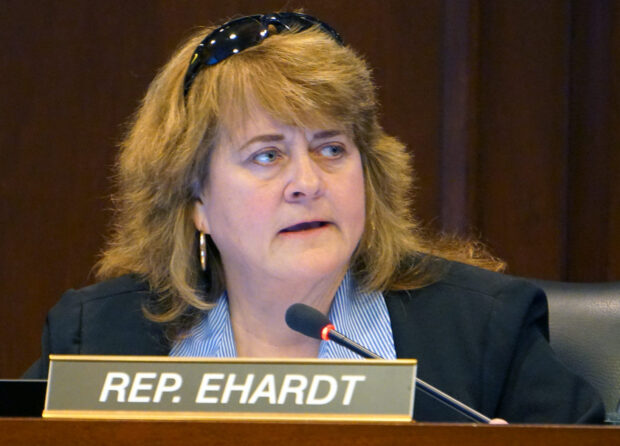A hearing over a bill to make sexual education courses available only to students of parents who specifically opt them in filled one Statehouse committee room Tuesday, and spilled into another.

The House Education Committee took no action on House Bill 120, after Chairman Lance Clow, R-Twin Falls, continued the hearing until Friday.
Before Clow adjourned the hearing, testimony ran 18-3 against the opt-in bill.
Tuesday’s hearing was so crowded that people sat on the floor and stood in aisles before Statehouse security asked more than 40 people to sit in an overflow hearing room.
Rep. Barbara Ehardt, R-Idaho Falls, pushed the bill, saying sex ed courses taught in Idaho schools do not align with Idaho values.
“This bill is very much about parents, parental rights, parental involvement, transparency and responsibility,” Ehardt said. “This bill is not about content; this bill is about consent.”
Ehardt specifically took issue with sex ed materials presented in a book called “Reducing the Risk.” Ehardt said the material teaches students about how to use a condom to reduce the risk of pregnancy and the spread of sexually transmitted infections.
“I don’t know about you guys — silly me — I was taught there was only one way to avoid pregnancy and that was pure abstinence,” Ehardt said.
After the meeting, Bonneville Director of Curriculum and Instruction Jason Lords and Bonneville Deputy Superintendent Marjean McConnell said only portions of the “Reducing the Risk” materials were used — to teach students in certified nursing assistant programs, and only after parents knew about the subject matter their children would encounter.
McConnell added that Ehardt never contacted the district office to ask about her concerns or clarify policy before drafting the bill. McConnell did not testify Tuesday, but said she would encourage the Legislature to reject the bill after pointing out Idaho law already allows parents to opt their children out of sex education courses.
“We have ample laws and policies in our district to take care of any concerns parents have,” McConnell said.
Many of the people who testified Tuesday were high school students, with some traveling from as far as Twin Falls to oppose the bill.
“Opt-in sex education instantly puts young people at a disadvantage,” 17-year-old Sabine Englert said. “This is because it serves as one more barrier between us and the necessary information about our own bodies we are entitled too.”
Sarah Pearce, 17, said she chose to testify after a friend of hers told her she didn’t realize people could contract a sexually transmitted disease through oral sex.
“This is a problem,” Pearce said. “We need to be expanding sex education.”
Lydia Christensen, an 18-year-old from Twin Falls, was one of several people who said an opt-in requirement could be dangerous to students who are abused by a parent or guardian.
“I would like to address that not all students come from homes that are safe and they too deserve to be heard,” Christensen said.
The Idaho School Boards Association also came out in opposition to the bill.
The three people who supported the bill included Rep. Bryan Zollinger, R-Idaho Falls, Christian Welp from the Catholic Diocese and John Paulton from the Family Policy Alliance of Idaho.
Paulton said some children may not be able to handle sex ed courses, and the state should trust their parents to do what is right.
“We can all agree sexual education is a loaded topic,” Paulton said. “Let’s allow parents to make an informed choice based on where their child is at.”
Welp said the moral responsibility for teaching such topics rests upon the home and the church, and that schools can only complement and supplement standards established in the family.
As Tuesday morning’s House floor session approached, Clow adjourned the hearing without calling for a vote. Clow said the committee will take the bill up again, likely on Friday morning.
